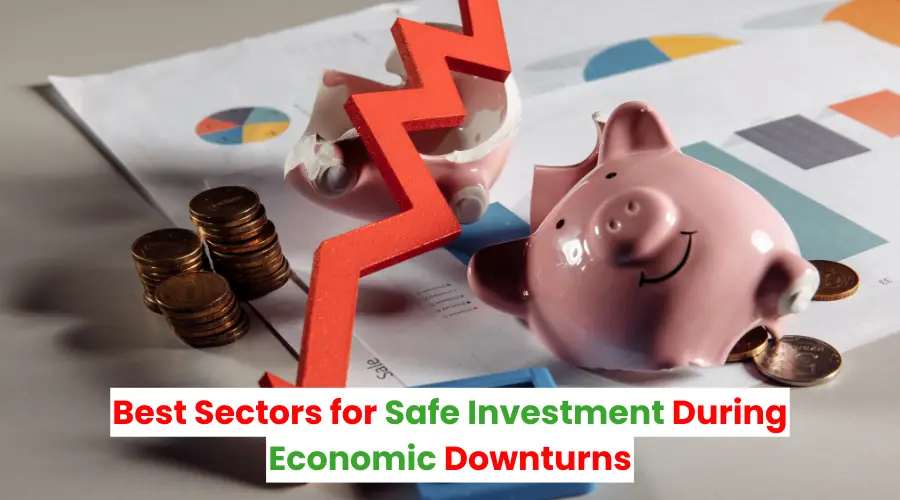Stock Market
Best Sectors for Safe Investment During Economic Downturns
Economic slowdowns can spook even the most seasoned investors. Stock prices fall, confidence drops, and suddenly — everyone starts to panic sell.
But here’s the thing: not all sectors crash equally. Some stay rock-solid, no matter how bad the news is.
This blog will enable you to know which industries are said to do relatively well even in down cycles — so you don't have to fear the next recession, but prepare for it intelligently.
What Happens to Stocks During an Economic Downturn?
Impact of slowdowns on stock sentiment
In the event of downturns, businesses are faced with reduced revenues, demand declines from customers, and optimism among investors is affected. Consequently, stock prices tend to plunge in all sectors.
Normal investor behavior
Retail investors mostly panic and sell at lows. However, astute investors switch their portfolios into defensive or safe sectors that continue to churn cash flows and address fundamental needs.
Safe Investment Sector Traits
Low volatility and high demand
These industries typically handle commodities and services individuals can't quit using, such as toothpaste, medicines, or electricity.
Government-supported or utility services
Industries with high government backing or are considered utilities (such as electricity, gas) have stable revenues and minimal default risk.
Best Industries Thought Safe Amidst Economic Slumps
FMCG (Fast Moving Consumer Goods)
- Consider HUL, Dabur, Marico.
- People continue to purchase soap, food, and essentials even in slowdowns.
- Cash flows consistently and brand loyalty maintain earnings steady.
Pharmaceuticals & Healthcare
- No matter what the economic cycles are, healthcare needs remain.
- Sun Pharma, Cipla, Dr. Reddy's showed resilience.
- Domestic + world generic export market = consistent growth.
Utilities & Power Sector
- NTPC, PowerGrid, Adani Green — they supply electricity and infrastructure.
- Highly regulated, but cash-generative and critical.
Insurance & BFSI (selectively)
- Not every banking stock, but insurance (such as HDFC Life, LIC) and big, clean NBFCs remain resilient.
- Individuals don't skip premium payments even during bad times.
IT Services (Export Oriented)
- TCS, Infosys are favored by international customers and dollar revenues.
- As Indian rupee declines in crisis, their margins increase.
- Home-work advantage and technology dependency facilitates continuity.
Real-Life Indian Market Case Studies
2008 Crash — Who Lived?
- Whereas infra & real estate plummeted overnight, FMCG and pharma floated.
- Nestle, HUL performed much better than Nifty.
COVID-19 (2020) – Recession Mode
- IT, pharma, and FMCG bounced back first.
- Banks with dirty loans got thoroughly battered (Yes Bank, IndusInd).
How to Build a Sector-Weighted Defensive Portfolio
Asset allocation ideas
- 30% FMCG
- 25% Healthcare
- 20% Large-cap IT
- 15% Utilities
- 10% BFSI (clean balance sheet only)
This keeps you balanced, defensive, and still growth-ready.
SIPs vs Lump sum
- Initiate SIPs in these industries to hedge risk.
- Steer clear of lump sum unless market drops 15–20% from highs.
Watch economic indicators
Monitor inflation, repo rates, and GDP trends to sense changes and rebalance sector-wise.
Avoid These Mistakes While Selecting "Safe" Stocks
- Don't presume all pharma or FMCG are safe — validate valuation & debt.
- Steer clear of high promoter pledging companies.
- Don't look for just past performance — future earning visibility is more important.
Conclusion
A market decline doesn't ask you to stop investing — it asks you to invest wisely.
Certain industries are more capable of enduring and thriving in difficult times, and that's where your portfolio must tilt when times are uncertain.
Would you like to know how to spot such industries, select correct stocks and create an impenetrable defensive strategy?
Begin with best share market institute in pune and learn about real investing — from real market professionals, not hype or theory.
Disclaimer:
This blog is intended for informational use only and does not qualify as investment advice. Consult with a licensed financial advisor or do your own research before making any investment. The past performance cannot guarantee future results. Investment in the stock market is risky.
FAQs:
Q1: Can defensive sectors also provide high returns?
Yes. In long term, a lot of FMCG and IT stocks have beaten high-risk industries with much lesser volatility.
Q2: Are bank stocks also safe?
Only select PSU or private banks with clean balance sheets. Stay away from high NPA or low margin banks during the downturn.
Q3: Do I leave growth industries in times of recession?
Not entirely. But switch half your allocation to safe industries as a hedge.
Q4: Is pharma still a good bet in 2025?
Yes, because of chronic disease patterns, India's low-cost manufacturing advantage and export demand.




